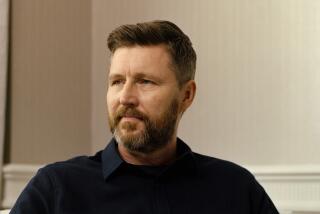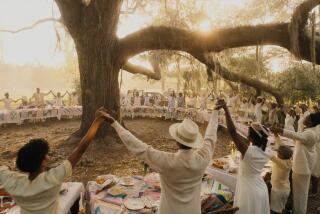Review: ‘Call Me Kuchu’ an unnerving look at Ugandan LGBT struggle
In a time when states are ratifying gay marriage at a record pace and the military’s “don’t ask, don’t tell” policy is old news, when the Boy Scouts of America reverse a controversial policy and now accept gay scouts, “Call Me Kuchu,” a documentary on Uganda’s gay rights debate, hits like a series of shock waves.
Filmmakers Katherine Fairfax Wright and Malika Zouhali-Worrall use understatement in laying out the explosive realities of life in Uganda for the LGBT community, the so-called kuchus. Homosexuality is illegal in their homeland — a conviction can bring 15 years in prison and the “curative rape” of girls is sanctioned.
More unnerving — and what initially brought the directors to the African country — is a bill still being considered by the Ugandan parliament that would make being gay punishable by death. Interviews with the anti-homosexuality bill’s author and its supporters are chilling.
RELATED: More movie reviews by The Times
Most shocking is the murder of Kampala gay activist David Kato, one of the film’s central figures, in January 2011, midway through production. Respect — for the man and for the mourning — resonates though the film.
In the wake of the murder, “Call Me Kuchu” could have turned into a film about a martyr. Instead, it holds to the filmmakers’ original intention to examine the larger implications of the country’s policies.
Still, Kato’s death divides the film into before-and-after stories. It begins beautifully. Kato is walking on his farm, hoping to build a safe haven for gays one day. It ends many months after his death as Ugandan gays try to keep the movement alive.
As Wright and Zouhali-Worrall began their project, the kuchus were mostly underground. But a series of events, from harassment to the introduction of the anti-gay bill, were increasingly forcing the issue. The film, mostly shot in Kampala, looks to give the debate a human face.
On one side is retired Anglican Bishop Christopher Senyonjo, who ministers to the kuchus and Kato, the country’s first openly gay man. On the other is Parliament member David Bahati, who introduced the anti-homosexuality bill, and Giles Muhame, managing editor of the tabloid, Rolling Stone, whose primary mission is to out gays.
Both Senyonjo and Kato light up the screen. The quietly heroic bishop is well-educated and well-versed on everything from theology to human sexuality. Kato, a schoolteacher, is charismatic, determined and blessed with an ironic sense of humor. He is also realistic. When a UN representative tells him the price of raising these issues is often blood, you can see it register on his face.
The temperature seems to change when Bahati and Muhame are on screen. While Bahati has the skills of a politician in defending Uganda’s ban on homosexuality, Muhame has none.
Kato was an integral part of a civil rights case against Rolling Stone that the directors follow; the ruling is caught on film just weeks before his death. News clips of the international protests and candlelight vigils will likely seem familiar — the face of a thoughtful man held aloft on a sea of posters.
The civil rights arguments and the activism are handled in remarkably objective fashion, though it is no mystery where the directors’ sentiments lie. Meanwhile, the anti-homosexuality bill, tabled not long after Kato’s death, has been revived, making the kuchu slogan, offered up many times in the film, sadly fitting, “A Luta Continua” — the struggle continues.
-----------------------------
‘Call Me Kuchu’
Rating: Not rated
Running time: 1 hour, 27 minutes
Playing: at Laemmle Music Hall, Beverly Hills
More to Read
Only good movies
Get the Indie Focus newsletter, Mark Olsen's weekly guide to the world of cinema.
You may occasionally receive promotional content from the Los Angeles Times.







